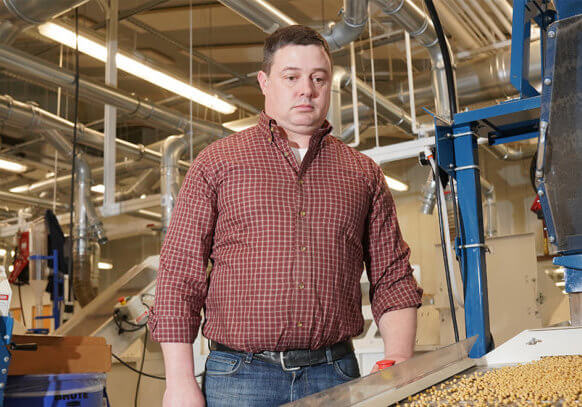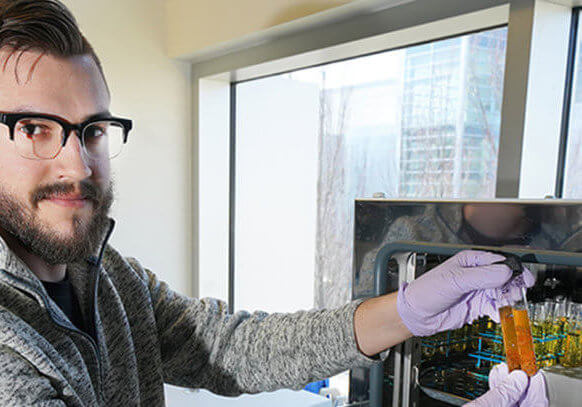F
oodborne illnesses linked to produce make regular news headlines these days. The U.S. Food and Drug Administration (FDA) has investigated outbreaks of Salmonella, Listeria and E. coli related to mushrooms, peaches, onions and clover sprouts just this year. FDA averages more than a dozen similar outbreaks annually.
Detecting contamination in the field is difficult because samples must be sent off to labs that can take several days to report results. But Purdue University biological engineer Mohit Verma is developing a test that could take less than an hour and help producers track the source of contamination. His efforts have been boosted by a nearly $400,000 grant from the Center for Produce Safety.
“The source of these contaminations is often wild animals or dispersion of bacteria from nearby animal feeding operations. Right now, it’s hard to test with enough frequency to catch these contaminations before produce is already harvested,” said Verma, an assistant professor of agricultural and biological engineering. “Since an entire field is currently tested as a whole, a positive contamination result from a lab leads to the loss of the entire field. Our technology would allow for multiple frequent tests that would significantly reduce the likelihood of losing an entire crop or sending contaminated food to consumers.”
Verma has been developing paper-based tests for bovine respiratory disease (BRD), an illness responsible for $900 million in losses to dairy and beef operators each year. The versatility of the technology has allowed Verma to adapt the work to this project, as well as development of a rapid COVID-19 test.

Much like a home pregnancy test, a sample from a field would be loaded onto a paper assay strip in a plastic cartridge. A biochemical reaction would alert a grower to the presence of bacteria that would be harmful to human health.
While pregnancy tests only require one particular hormone to signal a positive test, Verma’s sensors would alert to particular segments of DNA that are specific to the problem bacteria and the animals associated with them. The test, therefore, could tell a producer that contamination detected in a particular part of a field came from pigs.
“You can be specific about the areas you need to assess further and develop a heat map to determine where the contamination is coming from,” Verma said.
The two-year grant will allow Verma’s team to first identify normal background amounts of bacteria present in produce fields and improve the sensor technology to identify low levels of multiple bacterial contaminants in one test.
Conquering the Trail
Purdue Forestry and Natural Resources (FNR) alumnae Rebekah Lumkes and Baleigh Haynes joined an elite group of individuals, completing a 2,192 mile thru-hike of the Appalachian Trail. For one, it was the culmination of a college pipedream. For the other, it offered a much-needed life reset. Here is their story.
Read Full Story >>>Behind the Research: Jason Adams
Jason Adams starts each workday by checking the Indiana Corn and Soybean Innovation Center (ICSC) physical plant and the equipment that researchers have reserved for the day. “I’m an equipment junkie, and Purdue has given me a lot to take care of,” he says.
Read Full Story >>>Graduate researcher makes the most of fungi
Ethan Hillman likens his arrival at Purdue to speed dating. Hillman, who chose the Purdue Interdisciplinary Life Science (PULSe) program for graduate study, rotated through multiple labs, looking to find the right match for the next five years.
Read Full Story >>>Conquering the Trail
Purdue Forestry and Natural Resources (FNR) alumnae Rebekah Lumkes and Baleigh Haynes joined an elite group of individuals, completing a 2,192 mile thru-hike of the Appalachian Trail. For one, it was the culmination of a college pipedream. For the other, it offered a much-needed life reset. Here is their story.
Read Full Story >>>Behind the Research: Jason Adams
Jason Adams starts each workday by checking the Indiana Corn and Soybean Innovation Center (ICSC) physical plant and the equipment that researchers have reserved for the day. “I’m an equipment junkie, and Purdue has given me a lot to take care of,” he says.
Read Full Story >>>Graduate researcher makes the most of fungi
Ethan Hillman likens his arrival at Purdue to speed dating. Hillman, who chose the Purdue Interdisciplinary Life Science (PULSe) program for graduate study, rotated through multiple labs, looking to find the right match for the next five years.
Read Full Story >>>

